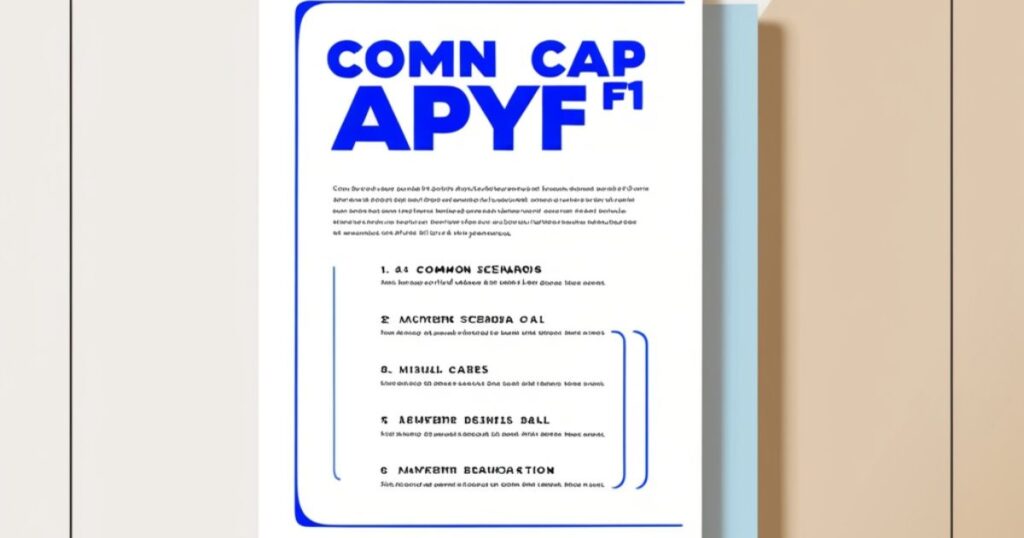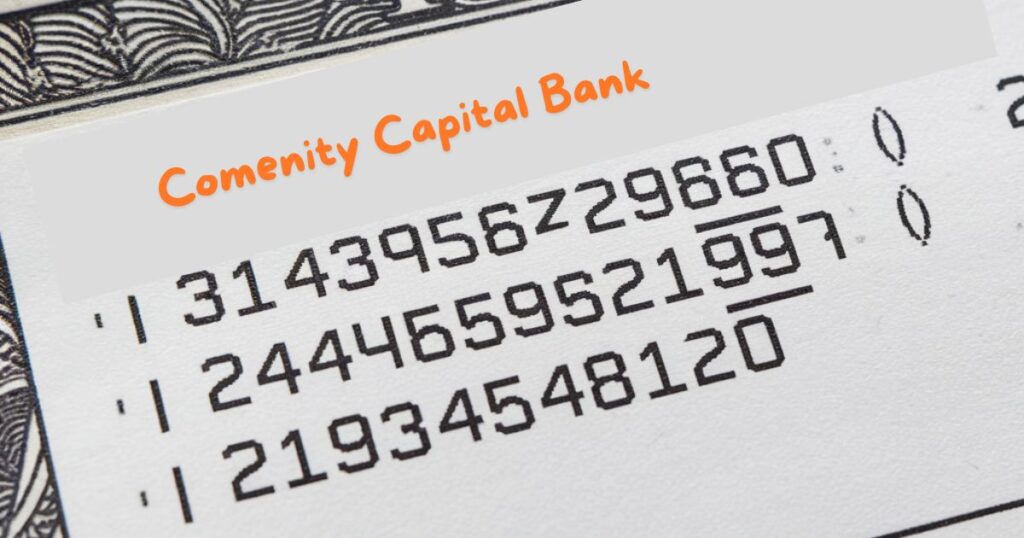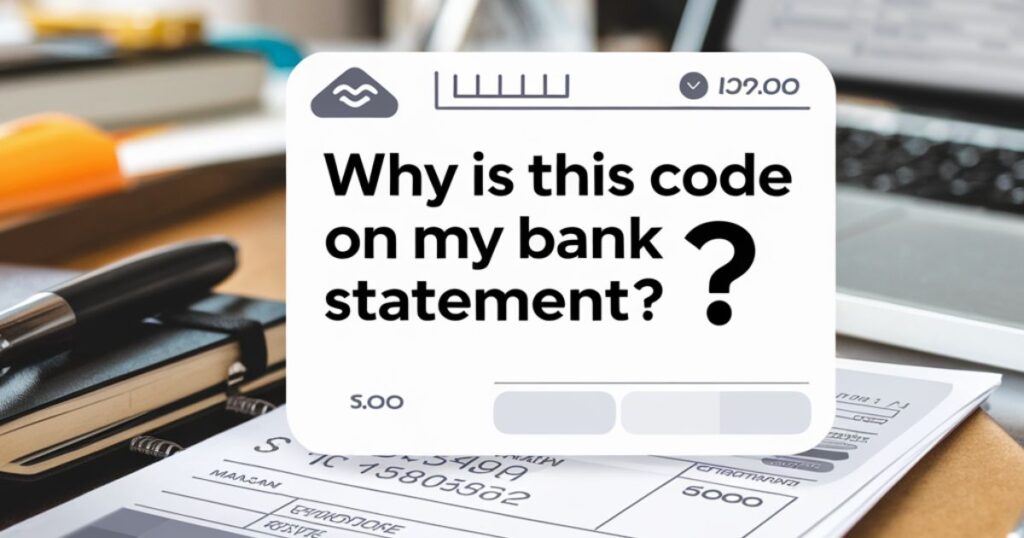Ever found yourself squinting at your credit card statement, baffled by a cryptic line that reads “COMN CAP APY F1 AutoPay”? You’re not alone in this financial puzzle. This mysterious code has left countless Americans scratching their heads, wondering if they’ve inadvertently signed up for some obscure service or fallen victim to a sneaky charge.
But fear not! We’re about to embark on an enlightening journey through the labyrinth of financial jargon to unravel this enigma and boost your financial clarity. By the time we’re done, you’ll be decoding your bank statement like a seasoned pro, armed with the knowledge to keep your finances in tip-top shape.
Cracking The Transaction Code: ACH-COMN-CAP-APY-F1
Let’s start by dissecting this alphabet soup. The transaction code “ACH-COMN-CAP-APY-F1” might look like a random string of letters, but each part has a specific meaning:
- ACH: Stands for Automated Clearing House, a network for processing electronic payments
- COMN: Short for Comenity, referring to Comenity Capital Bank
- CAP: Abbreviation for Capital
- APY: Represents AutoPay
- F1: An internal identifier used by the bank
Put it all together, and you’ve got a code that essentially means “an automatic payment processed through the ACH network to a Comenity Capital Bank credit card.” Not so intimidating now, is it?
This code is a prime example of how financial institutions use shorthand to convey complex information efficiently. While it might seem like gibberish to the untrained eye, it’s actually a concise way of communicating important details about a transaction.
Understanding these codes can give you valuable insights into your financial activities and help you spot any irregularities quickly.
COMN CAP APY F1 on Your Statement: Common Scenarios

What to do if you find COMN-CAP APY F1 on your credit card statement
If this code has popped up on your statement and you’re not sure why, don’t panic. Here’s a step-by-step guide to investigating the charge:
- Review your recent transactions and auto-payment setups
- Check if you’ve recently signed up for a store credit card
- Look for any recurring subscriptions or services linked to your card
- Contact your card issuer for clarification
Remember, knowledge is power when it comes to managing your finances. By taking these proactive steps, you’re not just solving a mystery – you’re cultivating good financial habits that will serve you well in the long run.
Reasons why COMN CAP APY F1 might appear on your statement
There are several reasons why you might see this code:
- Authorized automatic payments: You’ve set up auto payments for a credit card issued by Comenity Capital Bank.
- Recent store card sign-ups: You’ve recently opened a store-specific credit card that’s managed by Comenity.
- Forgotten subscriptions: An old subscription or service is still linked to your Comenity-issued card.
It’s worth noting that in today’s interconnected financial world, it’s not uncommon to have relationships with banks you might not immediately recognize. Comenity Capital Bank, for instance, operates behind the scenes for many popular retail credit cards.
How to remove COMN CAP APY F1 from your credit card bill
If you’ve determined that this charge is unwanted, here’s how to nix it:
- Contact your card issuer through their customer service channels
- Request to cancel the automatic payment
- Update your payment preferences in your online account
- Consider closing the associated store credit card if you no longer use it
Taking control of your automatic payments is an essential part of managing your finances. While auto-pay can be convenient, it’s crucial to ensure that you’re only paying for services you actually want and use.
Also Read This: Optimizing Pgbench for CockroachDB Part 3
Comenity Capital Bank: The Wizard Behind the Curtain

A brief introduction to Comenity Capital
Comenity Capital Bank isn’t a name you’ll see plastered on billboards, but it’s a major player in the world of retail finance. Founded over three decades ago, this financial institution has carved out a niche for itself by partnering with retailers to offer store-specific credit cards.
Comenity’s business model is built on white-label financial services, meaning they provide the backend infrastructure for many store-branded credit cards.
This approach allows retailers to offer credit to their customers without having to become banks themselves – a win-win situation for both the retailers and Comenity.
The bank’s services and role in your financial life
Comenity specializes in:
- Issuing co-branded and private label credit cards for retailers
- Managing rewards programs and perks for these cards
- Processing payments and handling bill settlements
Their behind-the-scenes role means you might be using their services without even realizing it. If you’ve ever signed up for a credit card at your favorite clothing store or furniture shop, there’s a good chance Comenity is working its magic in the background.
“In the world of retail finance, Comenity Capital Bank is like the stage crew in a Broadway show – you don’t see them, but without them, the show couldn’t go on.” – Financial Analyst Jane Doe
This invisible presence in your financial life underscores the importance of understanding your credit card agreements and the companies involved in managing your accounts.
It’s not just about knowing your credit limit and interest rate – it’s about comprehending the entire ecosystem of your financial relationships.
Why Is This Code on My Bank Statement?

You’ve authorized payments through Comenity Capital Bank
The most common reason for seeing COMN CAP APY F1 on your statement is that you’ve set up automatic payment methods for a Comenity-issued card. This could be for:
- Monthly minimum payments
- Full balance payments
- Fixed amount payments
Automatic payments can be a double-edged sword. On one hand, they ensure you never miss a payment, which is great for your credit score.
On the other hand, they can lead to a “set it and forget it” mentality that might cause you to lose track of your spending habits.
You might have utilized a store card
Many popular retailers partner with Comenity for their credit cards. Here’s a quick table of some well-known brands that use Comenity’s services:
| Retailer | Card Type | Notable Features |
| Victoria’s Secret | Store Card | Exclusive discounts, free shipping offers |
| Pottery Barn | Store Card | Special financing on large purchases |
| Wayfair | Store Card | $40 off first order of $250+ |
| Express | Store Card | Extra 10% off every purchase |
| Ann Taylor | Store Card | $15 reward for every $250 spent |
This table illustrates the diversity of Comenity’s partnerships and the various perks offered by these store-specific cards. It’s a testament to Comenity’s versatility in the retail credit space.
It’s an Auto-Payment: The Set-it-and-Forget-it Approach
Auto payments can be a lifesaver for busy folks who don’t want to risk missing a due date. However, it’s crucial to keep tabs on these automatic transactions. Here’s why:
- Pros:
- Ensures timely payments
- Helps avoid late fees
- Can improve credit score over time
- Reduces mental load of remembering multiple due dates
- Cons:
- May lead to overdraft if you’re not careful
- Could mask fraudulent activity if you’re not vigilant
- Might cause you to lose touch with your spending habits
- Can be difficult to adjust quickly if your financial situation changes
“Automation is great, but it should never replace awareness in your financial life.” – Anonymous Financial Advisor
This quote encapsulates the delicate balance between convenience and vigilance in personal finance. While automatic payments can simplify your life, they shouldn’t lull you into financial complacency.
Can I Dispute This Charge?

If you’ve spotted a COMN CAP APY F1 charge that you don’t recognize or didn’t authorize, you have the right to dispute it. Here’s a quick guide on how to handle potential unauthorized charges:
- Document the charge: Note the date, amount, and any other relevant details.
- Contact your card issuer: Use their official customer service line or online dispute process.
- Provide evidence: If you have any documentation proving the charge is erroneous, submit it.
- Follow up: Keep track of your dispute and follow up if you don’t hear back within a reasonable timeframe.
Remember, the Fair Credit Billing Act protects consumers from unfair billing practices. Don’t hesitate to exercise your rights if you believe a charge is incorrect.
Case Study: The Importance of Vigilance
Let’s consider the case of Sarah, a busy professional who noticed a COMN CAP APY F1 charge on her statement that she didn’t recognize. Here’s how she handled it:
- Sarah reviewed her recent purchases and couldn’t recall any store card sign-ups.
- She contacted her bank’s customer service and learned the charge was for a store card she had forgotten about.
- Sarah decided to cancel the card since she no longer shopped at that store.
- She updated her auto-pay settings to avoid future confusion.
Sarah’s experience highlights the importance of regularly reviewing your statements and not hesitating to ask questions about unfamiliar charges.
Frequently Asked Questions
To wrap things up, let’s address some common questions about COMN CAP APY F1 charges:
Why am I seeing this charge if I don’t have an account with Comenity Capital Bank?
You might have a store credit card managed by Comenity without realizing it. Many retailers use Comenity’s services for their branded credit cards.
How can I confirm if the ACH-COMN-CAP-APY-F1 charge is legitimate?
Review your recent credit applications and store card sign-ups, then cross-reference with your statements. You can also contact Comenity directly for clarification.
Is Comenity Capital Bank a legitimate financial institution?
Yes, Comenity is a legitimate bank regulated by the FDIC. They specialize in private label and co-branded credit card programs for retailers.
Can I opt out of automatic payments with Comenity Capital Bank?
Absolutely. Contact their customer service or manage your preferences online. Remember to set up alternative payment methods to avoid late fees.
What should I do if I suspect fraudulent activity related to a Comenity Capital Bank charge?
Immediately contact your card issuer and consider placing a freeze on your credit report. Report the suspected fraud to the FTC at IdentityTheft.gov.
In Closing: Navigating the Financial Maze
Understanding the COMN CAP APY F1 AutoPay code is just one piece of the puzzle in managing your finances effectively. Here are some key takeaways to remember:
- Stay vigilant: Regularly review your statements for any unfamiliar charges. Set a monthly “date” with your finances to go over your accounts.
- Keep records: Maintain a list of your credit cards and their associated auto-payment settings. A simple spreadsheet can work wonders for your financial organization.
- Ask questions: Don’t hesitate to contact your financial institutions for clarification. It’s your money, and you have the right to understand every charge.
- Embrace financial literacy: The more you understand about banking practices, the better equipped you’ll be to manage your money. Consider taking a personal finance course or reading financial blogs to expand your knowledge.
By demystifying these codes and understanding the role of institutions like Comenity Capital Bank, you’re taking an important step towards financial empowerment. Remember, knowledge is power – especially when it comes to your hard-earned cash.
In today’s complex financial landscape, being an informed consumer is more crucial than ever. The COMN CAP APY F1 AutoPay code is just one example of the many financial intricacies we encounter daily. By taking the time to understand these details, you’re not just solving a minor mystery – you’re building a foundation for long-term financial health and stability.
So, the next time you see COMN CAP APY F1 AutoPay on your statement, you can smile knowingly. You’re not just a savvy consumer; you’re a financial detective, cracking the code of modern banking one mysterious acronym at a time. And in the grand scheme of things, that’s a superpower worth having in your financial toolkit.
Remember, your journey to financial literacy is ongoing. Stay curious, keep learning, and don’t be afraid to ask questions. Your future self will thank you for the financial wisdom you’re accumulating today. After all, in the words of Benjamin Franklin, “An investment in knowledge pays the best interest.”

Hello, I’m Henry, a committed writer at supersbusiness.com, where I specialize in Business, Finance, Real Estate, and News. My articles explore a wide range of topics, providing readers with insightful and engaging content. With a knack for simplifying complex ideas, I aim to make my writing accessible and informative for all. Stay informed on the latest trends and insights by following me on supersbusiness.com.

